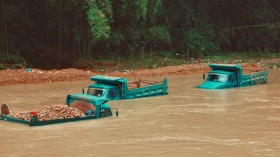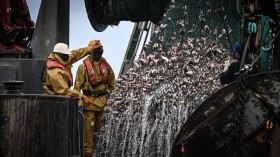The decades-long increase of summer sea ice in the Ross Sea has largely been an exception - one of just a few polar regions where summer sea ice has not been melting. But new research from the Virginia Institute of Marine Science suggests that this increase of sea ice over in the Ross Sea will be not last much longer.
Writing in the journal Geophysical Research Letters, VIMS professor Walker Smith and his colleagues report that their modeling study projects the Ross Sea will lose more than half of its summer ice cover by 2050 and more than three-quarters by 2100.
"The Ross Sea is critically important in regulating the production of Antarctica's sea ice overall and is biologically very productive, which makes changes in its physical environment of global concern," Smith said in a statement. "Our study predicts that it will soon reverse its present trend and experience major drops in ice cover in summer, which, along with decreased mixing of the vertical column, will extend the season of phytoplankton growth. These changes will substantially alter the area's pristine food web."
Phytoplankton are essential for ocean health because they serve as a direct food source for many ocean creatures, and many that survive on phytoplankton, such as krill, are staple foods of animals higher up on the food chain.
The decline in summer sea ice in the Ross Sea was observed in the models as an effect of substantial increases in air temperature, which will correspond with changes in the speed and direction of the wind and ocean currents.
"The modeled summer sea ice concentrations decreased by 56 percent by 2050 and 78 percent by 2100," the researchers reported. "The ice-free season also grew much longer, with the mean day of retreat in 2100 occurring 11 days earlier and the advance occurring 16 days later than now."
These changes, coupled with changes in the "shallow mixed layer" where phytoplankton live, suggest major changes to the ecosystem's currently pristine food web.
The decrease in sea ice is expected to promote phytoplankton growth, but other species in the food web that depend on ice, such as krill, will decline, the model suggests.
"A decrease in krill would be particularly troublesome, as these are the major food source for the Ross Sea's top predators-minke whales, Adélie and Emperor penguins, and crabeater seals," VIMS wrote in a statement.
Smith said that overall, the food web of the Ross Sea is likely to be "severely disrupted" by the predicted loss of sea ice, and that the results will bring "significant but unpredictable impacts on the ocean's most pristine ecosystem."
© 2024 NatureWorldNews.com All rights reserved. Do not reproduce without permission.




![Great White Sharks Observed for the First Time Changing Their Behavior in Different Marine Environments [Study]](https://1471793142.rsc.cdn77.org/data/thumbs/full/70251/280/157/50/40/great-white-sharks-observed-for-the-first-time-changing-their-behavior-in-different-marine-environments-study.jpg)
